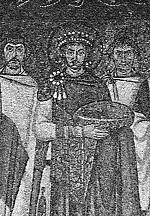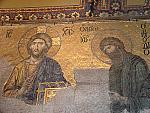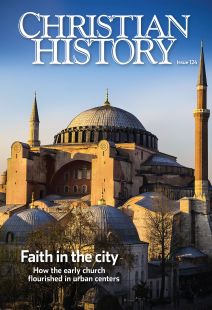“The only stumbling block is the cross”
Christian History: Tell us how you began ministry downtown.
Doug Banister: I pastored a church in the suburbs for 15 years. But I became interested in how monasteries tried to seek the peace of the city. We don’t always think of this, but a number of medieval monasteries were in urban areas. Then there were religious orders living in the world, like the Franciscans, and Devotio Moderna, a lay religious reform. Practicing hospitality in an urban space seemed like a good way to care for the city. I’ve now been at All Souls for almost 14 years.

All Saints sidewalk church. Courtesy All Saints Church
CH: How does All Souls seek the peace of the city?
DB: Jeremiah 29:7 is our mission statement. We don’t own a building, but we were able to be part of renovating one in the heart of the city. We rent space there and have a chapel. We try to pray the hours. We haven’t been able to staff it like we’d like, but we do have services on Sunday nights. We have about 125 people attending.
Early on I got a call from a man named Robert, who had a reputation as an intelligent businessman downtown. He asked if this was a monastery. I said “kind of“; we’re trying to pray and be here and practice hospitality. He lived nearby, and one night had the epiphany that God was real. He asked us to help him know God, and he became a follower of Christ. He recently died of a heart attack and is now buried in a monastery in New Mexico.
We put emphasis on partnering with other ministries that are already here. In the suburbs you might buy 20 acres and do your own thing. Here, sharing and collaborating is more important. We partner with an urban swim team, a health clinic for the working uninsured and underserved, and a mentoring program. We also have a fund where people in the congregation can apply for up to $1,000 for health care.
CH: How has All Souls affected the downtown?
DB: Our people are involved in nonprofits, jails, schools, and shelters, with both their money and time. I’d also like to think that we help in the renewal of downtown. We’ve encouraged people to support area restaurants. When we first started the church, the downtown was at a crossroads: not many stores, restaurants, and people. Some of the people starting to buy property weren’t doing good things with it. One building had a lot of drugs run out of it. I like to think that having a presence and offering prayers has helped create a healthy spiritual presence in the heart of the city.
If you try to plant an urban church with suburban values, or assume you’ll get a lot of Christians looking for a church, it won’t work very well. One of the things we decided to do early on was approach doctrine in a different way. We call it consensual orthodoxy. We ask our members to affirm the Nicene Creed as the doctrinal core of our church but give them the freedom to disagree and discuss all other issues. We don’t take positions on many controversial issues, but we care deeply about those issues and we work hard at talking about them. For urban post-Christian people, the only stumbling block we want to put before them is the cross.
By Doug Banister and the editors
[Christian History originally published this article in Christian History Issue #124 in 2017]
Doug Banister is the pastor of All Souls Church in Knoxville, TennesseeNext articles
Christian History timeline: the tumultuous life of early urban Christianity
The Christian History timeline for the early church in Roman cities
the editorsThe things that are Caesar’s
How Christians behaved as citizens, soldiers, and public servants
Rex D. Butler“The same kind of Christians we have always been”
We spoke to Karen Swallow Prior, author of Booked (2012) and Fierce Convictions (2014) and professor of English at Liberty University, about how Christians ought to live as citizens in the culture.
Karen Swallow Prior and the editors







